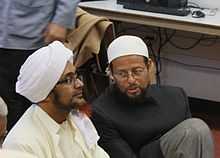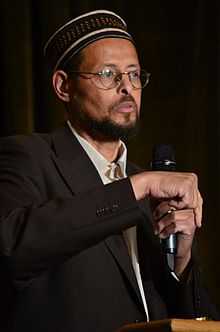Zaid Shakir
| Imam Zaid Shakir | |
|---|---|
|
Zaid Shakir at " Brick by Brick" fundraiser to build first Muslim Liberal Arts College located in Berkeley, CA. 2012 | |
| Born |
Ricky D. Mitchell May 1956 (age 58)[1] Berkeley, California, United States |
| Residence | Northern California, United States |
| Alma mater | Rutgers University [2] |
| Occupation | Islamic Scholar, Public Speaker, Author |
| Religion | Traditional Islam |
| Website | |
| New Islamic Directions.com | |
Zaid Shakir is a Muslim American scholar, public speaker, and author [3] who is a co-founder with Hamza Yusuf and Hatem Bazian, chairman of the board, and a senior faculty member of Zaytuna College in Berkeley, California. He teaches courses on Arabic, law, history, and Islamic spirituality.
He is co-founder and chairman of United For Change since 2009. This effort through modern discourse, is to create awareness of the broadest and most consuming topics within the Muslim and interfaith community. The aim is to leverage the diversity through cooperation and goodwill and address the obstacles that have proven to be divisive.[4]
The Chronicle of Higher Education stated, “Embodying an American story if ever there was one—including proverbial bootstraps, military service, political activism, and deep religious commitment—Zaid Shakir’s message of social justice in the face of poverty and racism he has known first hand makes him endlessly and, it often seems, effortlessly relevant. He is as approachable a man as I’ve ever met.” [5] He is one of the signatories [6] of A Common Word Between Us and You, an open letter by Islamic scholars to Christian leaders, calling for peace and understanding.
Early life
Shakir was Born 1956 [7] in Berkeley, California as Ricky Daryl Mitchell to a family descended from African, Irish and Native American [8] roots. His formative years were spent in housing projects in New Britain Connecticut. These early experiences instilled in him a compassionate and realistic work ethic, as well as, an unshakeable desire for social change and economic justice. He converted to Islam in 1977 while serving in the United States Air Force and shortly after changed his name to Zaid Salim Shakir.[9]
Education
A summa cum laude graduate, he obtained a BA in International Relations at American University in Washington, D.C., earned his MA in Political Science at Rutgers University.[9] He then left for Syria to pursue his studies in the traditional Islamic Sciences.[9] For seven years in Syria, and briefly in Morocco, he immersed himself in an intense study of Arabic, Islamic law, Quranic studies, and spirituality with some of the top Islamic scholars of our age, such as Sheikh Abd al-Rahman al-Shaghouri and Sheikh Mustafa Al-Turkmani. In 2001, he was the first American male graduate from Syria's Abu Nour University[8] with a BA in Islamic Sciences.
Recent work in the United States
Zaytuna College
In 2003, as a scholar-in-residence at Zaytuna Institute located in California, Shakir began to teach Arabic, Law, and Islamic spirituality. In 2004, he initiated a pilot seminary program at Zaytuna Institute, which was useful in Zaytuna College’s refinement of its Islamic Studies curriculum and its educational philosophy. For four years, students in the pilot program were engaged in the study of contemporary and classical texts. And, in the fall of 2010, he and his colleagues co-founded the Berkeley, California based Zaytuna College, a four-year Muslim liberal arts college, the first of its kind in the United States,[10] dedicated to "educate and prepare morally committed professional, intellectual, and spiritual leaders", who are grounded in the Islamic scholarly tradition and conversant with the cultural currents and critical ideas shaping modern society.
Views
He stated in a 2009 interview with USA Today, "as a faith community our needs aren't any different than the needs of any other faith community. As Muslims, we need to develop institutions to allow us to perpetuate our values."[11]
He has expressed a hope that the people of the United States convert to Islam, "Every Muslim who is honest would say, I would like to see America become a Muslim country. I think it would help people, and if I didn't believe that, I wouldn't be a Muslim. Because Islam helped me as a person, and it's helped a lot of people in my community."[12]
According to CNN blog This Just In, an article entitled "Today's Intriguing People" states, The New York Times has reported that Zaid Shakir is one of nine influential Muslim scholars who has appeared in a YouTube video denouncing militant Islam."[13][14]
Reception

A 200 page report entitled, “The 500 Most Influential Muslims” edited by noted professors John Esposito and Ibrahim Kalin was published November 20, 2009 by The Royal Islamic Strategic Studies Centre (Jordan) and the Prince Alwaleed Bin-Talal Center for Muslim-Christian Understanding (Georgetown University) describes Shakir as “an influential Islamic scholar".[15][16]
The New York Times describes him as "a leading intellectual light" whilst adding that he has "a history of anti-American rhetoric" that has mellowed over the years.[17] Tikkun Daily states that he is "one of the most thoughtful and dynamic teachers about the true nature of Islam in America today".[18]
Publications
Books authored
- Where I'm Coming From: A Year In Review, 2010
- Agenda To Change Our Condition, (Co-authored with Hamza Yusuf), 2007
- Scattered Pictures: A Reflection of An American Muslim, 2005
Books translated with additions
Books which include his foreword or note
- Green Deen: What Islam Teaches About Protecting the Planet, (editorial review), 2010
- Ascent to Felicity, (editorial review), 2010
- The War within Our Hearts: Struggles of the Muslim Youth, (wrote introduction), 2010
- Living With Blindness: Lessons from the Life of Imran Sabir, (wrote introduction), 2009
- Submission Faith and Beauty, The Religion of Islam (Co-edited with Hamza Yusef), 2008
- A Gathering of Voices on Caring For Creation, (contrib. article)The Zaytuna Ruku Tree, 2008
- Dear Self: A Year In The Life of A Welfare Mother, (wrote foreword), 2006
- The Empire and The Crescent, (contributed article Jehad as Perpetual War), 2004
Papers
- Crescentwatch Position Change
- An Examination of The Issue of Female Prayer Worship
- Malcolm X (1925-1965)
External links and further reading
| Wikimedia Commons has media related to Zaid Shakir. |
Websites
- Zaytuna.org – Imam Zaid Shakir co-founder and faculty member of College
- New Islamic Directions – Official Website
- Lectures of Imam Zaid Shakir
Articles and Interviews
See also
References
- ↑ The Muslim 500
- ↑ Edward E. Curtis, The Columbia Sourcebook of Muslims in the United States, p. 239. ISBN 0231139578
- ↑ John Esposito, The 500 Most Influential Muslims, p 102. ISBN 978-9957-428-37-2
- ↑ http://www.unitedforchange.com//
- ↑ http://www.www.newislamicdirections.com/nid/about/feedback#sthash.oen7pcXz.dpuf//
- ↑ http://www.acommonword.com/signatories/
- ↑ The Muslim 500
- ↑ 8.0 8.1 "Imam Zaid Shakir, biograpghy". Retrieved October 22, 2011.
- ↑ 9.0 9.1 9.2 "Media List – Imam Zaid Shakir Professor, Writer, and Scholar".
- ↑ http://www.zaytunacollege.org/about/
- ↑ Rachel Zoll (May 18, 2009). "Muslim plan for U.S. college moves ahead". USA Today (Google cache). Associated Press. Archived from the original on Oct 13, 2011. Retrieved October 23, 2011.
In 1996, Yusuf founded Zaytuna Institute, now based in Berkeley, Calif., which is dedicated to providing elementary education in classical Muslim scholarship. Zaytuna means "olive tree" in Arabic.
- ↑ "U.S. Muslim Clerics Seek a Modern Middle Ground" On page 4 of an article by Laurie Goodstein in The New York Times June 18, 2006
- ↑ Sidney Harman (August 3, 2010). "Tuesday's intriguing people". CNN. Retrieved October 23, 2011.
- ↑ Barbara Bradley Hagerty (September 8, 2010). "New College Teaches Young American Muslims". NPR. Retrieved October 23, 2011.
- ↑ The Royal Islamic Strategic Studies Centre. John Esposito, Ibrahim Kalin,, Ed Marques, Usra Ghazi, ed. The 500 Most Influential Muslims (1st ed.). Washington, D.C.: The Royal Islamic Strategic Studies Centre, The Prince Alwaleed Bin Talal Center for Muslim-Christian Understanding, Edmund A. Walsh School of Foreign Service, Georgetown University. p. 102. ISBN 978-9957-428-37-2.
shakir, Imam Zaid Shakir is an influential Islamic scholar currently affiliated with the Zaytuna Institute. He founded Masjid al Islam in Connecticut, founded the Tri-State Muslim Education Initiative and the Connecticut Muslim Coordinating Committee.
- ↑ Adil James (November 17, 2009). "Muslim 500 – A Listing of the 500 Most Influential Muslims in the World". The Muslim Observer. Retrieved October 23, 2011.
The 18 prominent American Muslims in the Scholars section of the book also include Yusuf Estes, Sulayman Nyang, Muzammil Siddiqui, Sherman Jackson, Zaid Shakir, and Nuh Keller
. - ↑ Goodstein, Laurie (June 18, 2006). "U.S. Muslim Clerics Seek a Modern Middle Ground". The New York Times. Retrieved October 23, 2011.
- ↑ Dave Belden (June 25, 2009). "Imam Zaid Shakir on the Tikkun Phone Forum". United Nations. Retrieved October 23, 2011.
